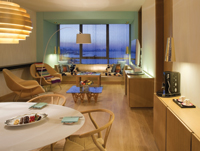
The luxury sector continues to grow across the world, with new brands heading to the Middle East
AS the travel and tourism sector rebounds from one of the worst economic slumps in recent history, one thing has become very clear; that while other areas of the economy were struggling, the luxury segment was little affected.
Last year London saw the long-awaited revamp of The Savoy hotel at a cost of millions of dollars and last month witnessed the opening of The Corinthia Hotel at Whitehall Place offering ultra-luxury accommodation in an iconic setting – a building owned, until 2007, by the British Ministry of Defence.
Meanwhile the Far Eastern market is rushing towards luxury development on a grand scale with casino giant MGM planning to open up to 30 hotels in China in the coming years.
And here in the Middle East, the traditional home of luxury, the move is continuing.
From the launch of the Armani Hotel in the iconic Burj Khalifa to the region’s first Missoni hotel in Kuwait, the major brands are still recognising the importance of the region.
Luxury hotelier Sir Rocco Forte recently told the ILTM Ultratravel Forum at Arabian Travel Market (ATM) 2011 that the Middle East is one of the key luxury travel markets worldwide and predicted considerable long-term potential for growth in this sector.
Founder of Rocco Forte Hotels, Sir Rocco first visited the region in 1978 for the opening of the International Hotel at Dubai International Airport as part of the former Forte Hotels group.
'The city has changed enormously, there is fantastic architecture and some amazing buildings,' he said. 'Some hotels have a Disneyworld feel and others are more sophisticated, but one enormous difference is that compared to Europe and the US, staffing levels are much higher and you can afford to enhance the service levels.'
 |
|
Missoni Kuwait shows iconic brands are recognising the region’s potential |
With the first Rocco Forte Collection hotel opening in Abu Dhabi this summer, Sir Rocco revealed plans for four additional properties – in Jeddah, Marrakech, Cairo and Luxor – and a strategy for further expansion.
'The Middle East is a huge source for luxury travellers and represents our fourth biggest market at Rocco Forte Collection,' he said. 'One of the reasons I am expanding here is to bring more awareness of our hotels in Europe and also to offer a European option for luxury travellers in the region.'
In the pipeline are revamps of two historic hotels in Egypt – the Shepherd Hotel in Cairo and the recently announced refurbishment of The Luxor Hotel, built in 1880 by John Cook, son of travel pioneer Thomas Cook.
The group will soon be joined by other prestigious offerings from the likes of St Regis, Ritz-Carlton and the region’s first Nobu Hotel as well as innovative developments such as the new lodges at Sir Bani Yas Island off the coast of Abu Dhabi.
Additionally, the region’s airlines are providing an ever increasing network of connections and private jet operators are making the Middle East a home station alongside cruise lines such as MSC which will home port in Abu Dhabi for the first time this season.
Essentially then, though the travel trade has suffered a downturn and the region has certainly been affected by recent political events, the luxury sector is still flourishing with Sir Rocco concluding: 'There has been a temporary hiatus in tourism in the region due to the recent events but, in the longer term, this is a wonderful area for luxury travel with potential to develop the product.'
